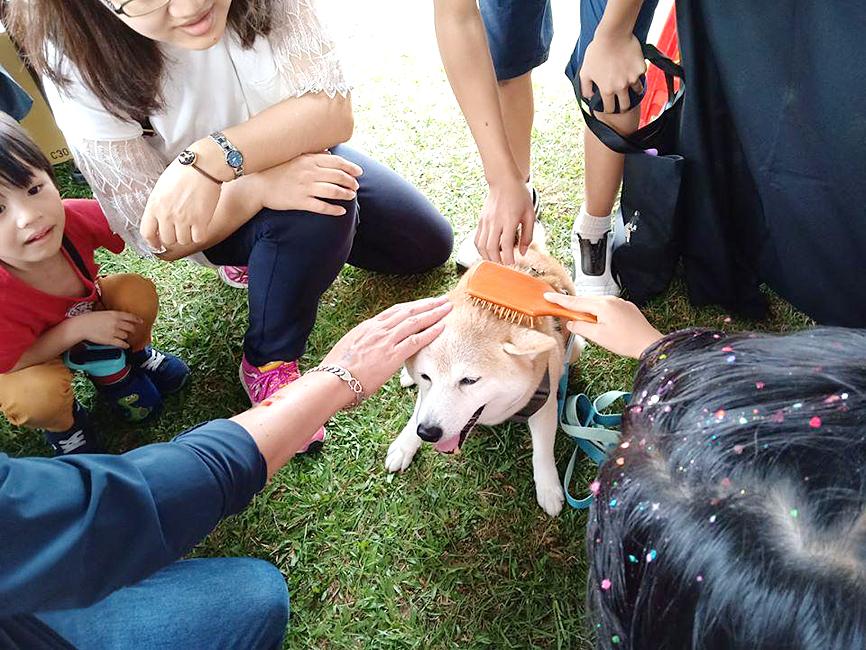In Taiwan, there is a group of doctors that cannot speak, but has helped countless children and old people heal, performing therapies that humans cannot offer, and these doctors can be referred to as “Dr dog,” Formosa Animal-Assisted Activity and Therapy Association chairman Collier Chang (張泮崇) said.
More than 500 “dog doctors” have been trained over the past two decades to provide animal-assisted therapies for people receiving rehabilitative treatment, including children and elderly people.
Speaking of Shirley Chen (陳秀宜), the founder of the association, Chang said: “Chen used to volunteer at an animal hospital overseas, where she saw dog doctors for the first time.”

Photo courtesy of Taiwan Dr. Dog Association
“Chen then introduced the training system for dog doctors in Taiwan with assistance from the Animals Asia Foundation, and founded the association in 2001,” he added.
Concerned with the rising number of abandoned dogs in Taiwan, Chen also included stray dogs in her training program, giving the animals a second chance to foster a close relationship with humans, he said.
The dog doctors’ services range from accompanying people in their everyday life to rehabilitation therapies, with services offered mainly in schools, medical institutions and care centers, said Teng Hui-chin (鄧惠津), a trainer at the association.
Being treated by a dog doctor has clear therapeutic effects, as some bed-ridden people said their mood improves when being with a therapy dog, and they would always look forward to sessions with their four-legged friends, she said.
Although some children in special education schools were at first reluctant to approach the dogs, they quickly adapted and felt comfortable, Teng said.
A woman with terminal cancer and a prognosis of only eight months to live has carried on for more than seven years and is still frequently seeing her dog doctor, she said.
Some special education teachers incorporate dog doctors into their teaching plans, boosting their students’ motivation to learn, Teng said.
For example, teachers might encourage speaking-impaired students to say the names of the dogs, or to speak to the animals, before and while they are petting the dogs, she added.
Caretakers, social workers and occupational therapists also include the dog doctors in their therapies, she said, adding that patients would comb or pet the dogs, or take them out for walks or play fetch.
Although therapies largely rely on the dog doctors’ abilities, their owners are equally important during training and therapy, she said, adding that owners facilitate interactions between dogs and humans, and their presence motivates the dogs to do their best.
The process of becoming a dog doctor can be strenuous. Before dogs can be enrolled in the three-level training courses, their aptitude and health have to be assessed. Each level of the course requires six weeks of exercises, that demand the dogs’ full attention.
Only then would the dogs be allowed to intern at therapy facilities, and only if a dog has gained enough experience, can it join the ranks of certified dog doctors, she said, adding that annual refresher courses must also be completed.
The training is not exclusive to dogs preparing for a therapeutic career, as owners who hope to learn more about their dogs’ behaviors are welcome to enroll, too, she said.

WANG RELEASED: A police investigation showed that an organized crime group allegedly taught their clients how to pretend to be sick during medical exams Actor Darren Wang (王大陸) and 11 others were released on bail yesterday, after being questioned for allegedly dodging compulsory military service or forging documents to help others avoid serving. Wang, 33, was catapulted into stardom for his role in the coming-of-age film Our Times (我的少女時代). Lately, he has been focusing on developing his entertainment career in China. The New Taipei District Prosecutors’ Office last month began investigating an organized crime group that is allegedly helping men dodge compulsory military service using falsified documents. Police in New Taipei City Yonghe Precinct at the end of last month arrested the main suspect,

Eleven people, including actor Darren Wang (王大陸), were taken into custody today for questioning regarding the evasion of compulsory military service and document forgery, the New Taipei District Prosecutors’ Office said. Eight of the people, including Wang, are suspected of evading military service, while three are suspected of forging medical documents to assist them, the report said. They are all being questioned by police and would later be transferred to the prosecutors’ office for further investigation. Three men surnamed Lee (李), Chang (張) and Lin (林) are suspected of improperly assisting conscripts in changing their military classification from “stand-by

LITTORAL REGIMENTS: The US Marine Corps is transitioning to an ‘island hopping’ strategy to counterattack Beijing’s area denial strategy The US Marine Corps (USMC) has introduced new anti-drone systems to bolster air defense in the Pacific island chain amid growing Chinese military influence in the region, The Telegraph reported on Sunday. The new Marine Air Defense Integrated System (MADIS) Mk 1 is being developed to counter “the growing menace of unmanned aerial systems,” it cited the Marine Corps as saying. China has constructed a powerful defense mechanism in the Pacific Ocean west of the first island chain by deploying weapons such as rockets, submarines and anti-ship missiles — which is part of its anti-access/area denial (A2/AD) strategy against adversaries — the

A cat named Mikan (蜜柑) has brought in revenue of more than NT$10 million (US$305,390) for the Kaohsiung MRT last year. Mikan, born on April 4, 2020, was a stray cat before being adopted by personnel of Kaohsiung MRT’s Ciaotou Sugar Refinery Station. Mikan was named after a Japanese term for mandarin orange due to his color and because he looks like an orange when curled up. He was named “station master” of Ciaotou Sugar Refinery Station in September 2020, and has since become famous. With Kaohsiung MRT’s branding, along with the release of a set of cultural and creative products, station master Mikan